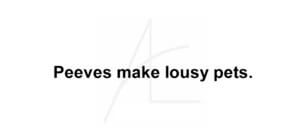
Peeves make lousy pets.
Knowing this doesn’t help; I still keep a few pet peeves. One of my pet peeves is this statement, “You don’t know what you are doing.” Why is this a pet peeve? It denies the obvious fact that everyone one of us, everywhere, is still learning.
“My Name is Andy and I Own and Operate a Consulting Company.”
“But Andy, you don’t know how to own or operate a consulting company.” That may or may not be a true statement. What is a truer statement? I may not know everything there is to know about owning and operating a consulting company, but I can learn.
“My Name is Andy and I Built a Software Product.”
“But Andy, you don’t know how to build a software product.” That may or may not be a true statement. What is a truer statement? I may not know everything there is to know about building a software product, but I can learn.
Interesting sidebar: SSIS Catalog Compare is not only the first product I’ve ever written, it’s the first complete application I’ve written in C#.
“My Name is Andy and I Co-Host a Successful Podcast”
“But Andy, you don’t know how to co-host a successful podcast.” That may or may not be a true statement. What is a truer statement? I may not know everything there is to know about co-hosting a successful podcast, but I can learn.
I Can Learn
I know I can learn because I have demonstrated this fact many times over. I proved it last month (at the time of this writing – April 2018 thereafter) when I completed the Microsoft Professional Program for Big Data. I proved it by learning enough C# to write Catalog Compare, Catalog Browser, and Framework Browser.
I promise I am learning more every day about owning and operating Enterprise Data & Analytics and building and managing the software solutions and products that make up the DILM Suite – including products like SSIS Catalog Compare and the SSIS Framework – and co-hosting Data Driven, with Frank La Vigne (@Tableteer).
“I couldn’t so you shouldn’t.”
What I Know
What is someone truly saying – what do they truly mean – when they say or write someone doesn’t know what they’re doing?
They’re making this statement about themselves: “I couldn’t so you shouldn’t.”
No one brings this point home better than Grant Cardone in his book (get the audio book – you are welcome), Be Obsessed or Be Average, or #BOBA. The followup to his (awesome) book, The 10X Rule, Be Obsessed or Be Average complements and completes Cardone’s thoughts on the hard work and time required to achieve success.
“What is the Point, Andy?”
When people make statements like “You don’t know what you are doing,” they are saying, “I gave up so you should give up, too,” or, “I didn’t get what I wanted so you don’t deserve what you want, either.”
This is very fair thinking.
When I write the word “fair” I shudder at what “fair” has come to mean and how it’s been used to justify junk and the crap it’s been used to rationalize.
Conclusion
I am not going to quit learning.
I will continue to try to make old things work better.
I will continue to try new things.
I will fail more often than I succeed (this is how I learn).
I will not stop until I go home.
My advice, encouragement, exhortation:
- Don’t quit.
- Make the problems give up before you do.
- Listen to people who have succeeded (or are succeeding).
- Do not listen to people who have given up.
I have more to learn and I know that.
Peace,
Andy


2 thoughts on ““You Do Not Know What You Are Doing””